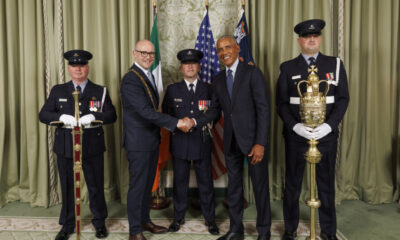Opinion
Ella Baron on Keir Starmer’s plans for digital ID – cartoon
Read more on post.
Opinion
It’s a jungle out there: Sorcha Pollak on growing up fast while working in the Amazon at 18

Read more on post.
Almost exactly 20 years ago, September 9th, 2005, to be exact, I stepped on board a flight that whisked me away from the secure, safe and reliably predictable first 18 years I’d spent on this earth.
Three months after sitting the Leaving Cert, when most of my peers were returning from post-exam holidays and making final arrangements before embarking on university life, I set off for South America.
In many ways September 9th was the day my journalism career began. With no mobile phone and limited access to a landline in my new Peruvian home, I kept a weekly blog of my experiences working with children in Iquitos, a city deep in the Amazon jungle, accessible only by plane or boat. In 2005, writing a blog was still a novel endeavour, at least within my social circle.
It offered a young, aspiring writer the blank page to share her ideas and experiences without (too much) judgment. These were the days before angry keyboard warriors. Let’s be honest, the small number that did exist had no interest in the idealistic musings of a Dublin teenager.
Social media and smartphones had not yet taken over our lives. Facebook only became available for a small number of Irish students in 2006. Before this, we occasionally logged into the slow-moving, clunky Bebo on our parents’ desktop computers.
Households lucky enough to own a computer often relied on a modem connection. In short, people’s lives were not yet posted in real time, communication could truly be cut off and one could genuinely disappear into a jungle and rely primarily on letters and care packages containing newspaper cuttings for contact with the outside world.
Each Saturday, after a week of homework clubs, music lessons, toddler nappy changes and poorly dubbed movies, my fellow volunteer and I took a motor-taxi down the dusty, unpaved Avenida José Abelardo Quinones to Iquitos’s Plaza Mayor, where we spent two sweaty hours writing emails and blog posts and catching up with family members on MSN chat.
From there, we headed to the bustling Belén market to pick up our papaya and mango supply for the week, often stopping by the bank or cinema lobby to avail of the cool, air-conditioned air pumped into only a handful of city centre buildings.
While temperatures rarely exceeded 35 degrees in Iquitos, the daily humidity hovered between 85-90 per cent and our electric fan broke early in the year. My teenage body was forced to quickly acclimatise and two decades on, I still enjoy my deepest sleeps when visiting hot climates.
The heat wasn’t all bad – it forced us to explore the tributaries of the Amazon in long wooden canoes with newly found friends, seeking out swim spots where we spent afternoons munching on fried plantain and sipping glass bottles of Inca Kola – a bubblegum-flavoured, highly addictive, yellow soda that remains a staple beverage across Peru.
The twice-to-three-times-weekly power cuts, often leaving us without light or running water, were just another quirk of jungle city life.
I was undeniably homesick – for my parents, my sister, pasta and Dairy Milk. I was confronted with grief for the first time in my young life, mourning the loss of my grandmother while her funeral was held in a Dublin church thousands of miles away.
I kept getting sick and ending up on a drip in the crowded and chaotic local hospital (they eventually discovered a parasite had set up camp in my gut). But yet, I loved it all.
Earlier this month I spent 36 hours in Manchester with the two women I shared that year with. The Mancunian I lived with, another naively idealistic 18-year-old who was forced to become my unofficial carer during those regular hospital visits, is now an emergency transplant nurse. There was prescience in her caring abilities.
Our conversation over those two days meandered between children, pregnancy, miscarriages, housing costs, job struggles and relationship grievances. All the topics you’d expect a trio of western white women in their late 30s to discuss.
But every now and then, our chats would diverge in a different direction, to recollections of hiking through landslides, drinking in bars hanging over the banks of the Amazon, hallucinations caused by our daily dose of Larium – an antimalarial drug that was subsequently withdrawn from sale – and being abducted by a gun-carrying criminal gang in the Bolivian capital of La Paz on the eve of the election of Evo Morales in 2005 (this actually happened).
I prefer not to reflect too much on what might have followed had a female police officer, who happened to be walking by the vehicle we’d been held in, not knocked on the window.
[ An Irish woman in Peru: ‘I found it easy setting up a business here’Opens in new window ]
And then there were the seemingly more mundane tasks of life in Iquitos – the weekly routine of caring for young children abandoned by their families in the “Aldea” where we lived and worked.
“Do you remember we used to walk the kids on a Sunday to the local prison to visit their parents,” asked my friend, recalling a memory I had totally erased from my mind.
Even today, the names of those children, some of whom were adopted outside Peru to countries around the world, names such as Orlando, Danisa and Luis, remain imprinted in my mind. Forever associated with the smiling faces that greeted me every morning for 12 months.
We also spoke of our admiration for our parents who allowed their teenage girls to quite simply disappear abroad. Years after my return, my unceasingly stoic mother admitted she cried herself to sleep for weeks following my departure. We 1980s millennials were not yet privy to the phenomenon of helicopter parenting. Lucky us.
[ Helicopter, free-range, concierge, lighthouse: What kind of parent are you?Opens in new window ]
Opinion
The Guardian view on Labour conference: a clash of visions and direction, not egos and personnel | Editorial
Read more on post.

Sir Keir Starmer’s authority is fading. His poll ratings, and Labour’s, are disastrous. Key lieutenants are departing. With Labour conference looming, the talk is less about governing than about whether Manchester mayor Andy Burnham is positioning himself for the top job. In this context, Sir Keir’s speech on Friday to fellow centre-left leaders deserves close attention. It was continuity dressed as renewal: capital behind the wheel, social policy just along for the ride.
Tellingly, Sir Keir invoked “abundance” – the buzzword of American supply-side liberals and title of Ezra Klein and Derek Thompson’s eponymous book. In Washington, it is the banner for centrists who pin prosperity on deregulation, rapid infrastructure rollout and market-led growth, with redistribution an afterthought. Sir Keir rebranded it “social democracy”. This was some chutzpah: a rallying cry from a civil war inside America’s Democratic party dressed up as Britain’s progressive future.
In the UK, Sir Keir argues, the political flashpoint is illegal migration. He claimed it was too easy to slip into off-the-books work and stay. But migrants in Britain already live with digital proof of status: a nine-character share code handed to employers or landlords, who verify it against a Home Office database. Sir Keir now proposes to treat British citizens the same way. A universal digital ID, mandatory for the right to work, is presented as protection against a shadow economy and another Windrush scandal. In reality, it risks laying the foundations for something more far-reaching. A consultation will consider whether including “additional information … would be helpful”. That opens the door to the Tony Blair Institute’s vision: a unified digital infrastructure that can link health, welfare, housing, tax and migration records. This would be not just a work check, but a national data spine – a backbone of interoperable personal information, attractive to Big Tech. Fights loom over gender identity, police access for protest surveillance and corporate capture. Digital identity can be built as public infrastructure, empowering citizens and protecting rights as in Estonia and Denmark. Sir Keir’s choice seems to follow the Anglo-American, not European, script.
Enter Mr Burnham, sketching a different course. His “Manchesterism” sees national control of the essentials: housing, energy, transport, water. He wants prices regulated via public coordination to keep costs low. He says long-term borrowing should be used to build the social stock. He is unafraid to float another £40bn for social housing, or to dismiss “bond vigilantes” as arbiters of affordability. On the continent this is normal politics. In Britain it marks a bracing break with the post-1980s consensus.
The irony is that Sir Keir once campaigned on a similar programme: public ownership, higher taxes for the wealthy and a Green New Deal. One by one those promises were abandoned as high office came into view. What remains is cautious orthodoxy. Mr Burnham is offering Labour members what Sir Keir once promised, before discarding it. That is, no doubt, why “Manchesterism” appeals to members and unsettles Downing Street. It is not nostalgia for municipal socialism, but closer to European models of interventionist capitalism: taming costs directly, rather than waiting for markets to deliver. The contrast is stark. Sir Keir sells continuity. Mr Burnham’s ideas offer rupture. The question for Labour conference is which future the party wants.
-
Do you have an opinion on the issues raised in this article? If you would like to submit a response of up to 300 words by email to be considered for publication in our letters section, please click here.
Opinion
The Guardian view on the 200th anniversary of the railways: much more than a way of getting from A to B | Editorial
Read more on post.

When Robert Stephenson and Co’s Locomotion No 1 arrived in Stockton on 27 September 1825, the first rail vehicle ever to transport passengers, it was met by a seven-gun salute and a crowd bowled over by the spectacle. “It was found to be quite impossible to restrain the enthusiasm of the multitude,” reported a mildly concerned Durham County Observer journalist.
This weekend the celebrations are likely to be slightly less wild, as the bicentenary of the pioneering Stockton and Darlington railway line (S&DR) is marked. But they will undoubtedly be heartfelt. A replica of the pioneering engine is to recreate the inaugural journey, with viewing tickets sold out along the route and a big screen following its progress in Darlington’s town centre. A set of commemorative stamps is being issued, which feels appropriately old school. And coming in on time, the National Railway Museum in York – a magnet for visitors from the day it opened in 1975 – is reopening after a multimillion-pound refurbishment.
The businessmen who invested in the S&DR were motivated by the functional benefits of transporting coal more efficiently from Durham’s collieries. But their enterprise eventually unlocked far wider human possibilities, transforming perceptions of distance and changing the way the nation lived. Trains carried Victorian working-class families to the seaside and back, and reunited lovers on windswept platforms. Packed 20th-century commuter trains shuttled between satellite towns and cities. A railway station became part of the identity of a place, as well as a point of departure from it.
These days the railways are journeying with difficulty towards a new era. The short-sighted Beeching cuts of the 1960s, and the needless, botched privatisation of the 1990s, were unforced political errors whose legacy is still felt today. Prohibitive fares, fragmentation, and chronic mismanagement in the north, where the story began, blight the contemporary network. HS2 remains a staggeringly expensive fiasco.
As the government gradually takes more train operators back under public ownership, a much-needed strategic reboot is required. The rail industry should become a crucial driver of green sustainable growth. Sadly, reports that plans to extend high-speed rail across the north of England are yet again to be delayed do not inspire confidence.
For train lovers though, this weekend is about the past not the future. Locomotion No 1 launched a journey which was about far more than travelling from A to B. From E Nesbitt’s evocation of a rural Edwardian childhood in The Railway Children, to WH Auden’s poem, Night Mail, the trip has left its mark on our literature. Flanders and Swann memorialised lines lost to Beeching in song. Carnforth in Lancashire still celebrates its station’s role in the cinema classic Brief Encounter, where a doomed romance is brought to a close by a guard’s whistle, and the rhythmic sound of wheels beginning to move on track.
Just north of Carnforth one of Britain’s great train routes begins, as the curve of Morecambe Bay permits spectacular views of vast sands and, further away, the Lakeland fells. It would be fatuous to try to name the UK’s most beautiful railway line, but there are many to choose from. Passengers (not customers) can watch the show, read a book or fire up their laptop, enjoying the freedom of being between places. The cheering Stockton crowds of 1825 were right to think they had seen the future, and that it worked.
-
Do you have an opinion on the issues raised in this article? If you would like to submit a response of up to 300 words by email to be considered for publication in our letters section, please click here.
-
Politics3 days ago
European Parliament snubs Orbán with vote to shield Italian MEP from Hungarian arrest
-
Culture3 weeks ago
Life, loss, fame & family – the IFI Documentary Festival in focus
-
Health4 days ago
EU renews support for WHO’s Universal Health Coverage Partnership
-
Culture2 months ago
Fatal, flashy and indecent – the movies of Adrian Lyne revisited
-
Environment7 days ago
Key oceans treaty crosses threshold to come into force
-
Culture4 days ago
Twilight at 20: the many afterlives of Stephenie Meyer’s vampires
-
Culture1 week ago
Farewell, Sundance – how Robert Redford changed cinema forever
-
Culture4 weeks ago
What is KPop Demon Hunters, and why is everyone talking about it?















































